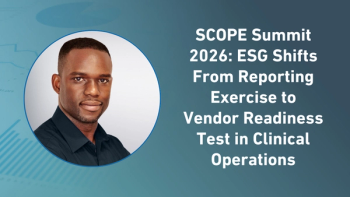
- Applied Clinical Trials-03-01-2022
- Volume 31
- Issue 3
Utilizing Outreach and Communication
Tony Clapsis, SVP, Clinical Trials Services, CVS, discusses recent advancements in the clinical trials space by CVS.
CVS is one of the most recognizable brands across the world. However, its work in clinical trials sometimes goes by the wayside. In this interview, Tony Clapsis, SVP, Clinical Trials Services, CVS, discusses recent advancements in the clinical trials space by CVS and how the pharmacy giant will attempt to reach more patients and healthcare providers (HCPs) than ever.
Applied Clinical Trials: CVS has been conducting clinical trials for about 15 years but announced last May a dedicated Clinical Trials Services business. What was the impetus for forming the business now?
Tony Clapsis: The new business aims to harness CVS Health’s ability to reach more people and improve the health of communities across America through our local presence, digital channels, and approximately 300,000 dedicated colleagues—including more than 40,000 physicians, pharmacists, nurses, and nurse practitioners. Despite the important role clinical trials play in evaluating the safety and efficacy of investigational new drugs and devices, less than 4% of the US population participates in clinical studies. In addition, 80% of studies don’t meet participant enrollment deadlines, and an average of 30% of participants drop out before a study is completed.
We are helping to overcome the obstacles that result in these numbers by bringing to bear the considerable resources of CVS Health and our innovative approaches and experience to address the need to drive greater access to clinical trials across the communities we serve. About 80% of the US population and more than 40% of US vulnerable populations, as defined by an SVI (social vulnerability index) score of .5 or greater, lives within a five-mile radius of a CVS store.
ACT: Will every CVS location have clinical trials patient access?
Clapsis: Our Trial Ready HealthHUB network is expanding and scaling rapidly. This expansion is done strategically based on several factors, including population, therapeutic area needs, demographics, and more. We currently have 10 sites in four states equipped to deliver clinical trials and are continuing to increase this number throughout this year and beyond.
ACT: CVS Clinical Trials Services recently announced a collaboration with Medable to use its clinical trial software platform. Is this your chosen technology for clinical trial data collection or will there be others?
Clapsis: Medable is the preferred technology solution for decentralized clinical trial (DCT) services. CVS Health works with many other companies to support clinical trials.
CVS Health and Medable are both committed to expanding engagement within clinical trials. Our collaboration, utilized in the appropriate settings, will help us work toward this goal. We see this as a great opportunity for two innovative companies with compatible solutions to drive innovation and results in this space effectively and at scale. Combining Medable’s software platform with CVS Health’s community reach and experienced MinuteClinic providers, we improve participant engagement, retention, and site data capture.
ACT: Clinical trials and patient healthcare are two separate areas in regard to regulations, data, and ethical intent; healthcare to treat patients and clinical trials to study the effects of a drug in patients. How will these two areas be managed successfully in the walls of a pharmacy or health clinic?
Clapsis: At CVS Health, standard of care and clinical trials are managed in accordance with applicable industry and regulatory requirements to ensure the safety and privacy of the patients and research subjects. The clinical trial teams handling studies are trained in accordance with applicable regulatory standards, including FDA regulations relating to good clinical practice (GCP) governing human subject protection and the conduct of clinical trials, and in accordance with the appropriate institutional review board (IRB) evaluation.
The clinical teams are trained to know when to apply standard of care operating procedures and processes vs. clinical study protocols and GCP protections to ensure that we are adhering to FDA regulations governing human subject protection.
Articles in this issue
almost 4 years ago
Africa is Biosimulation’s Next Frontieralmost 4 years ago
CRO Update: Where are Contract Research Organizations Headed?almost 4 years ago
What is a CRO?almost 4 years ago
CROs Rise to COVID Pandemic Challengesalmost 4 years ago
ACRO Offers Blunt Take on EU Clinical Trial Legislation Pursuitsalmost 4 years ago
A List of CROs with Rough Justice Appliedalmost 4 years ago
Applied Clinical Trials March 2022 Issue (PDF)almost 4 years ago
A Rocky Road Ahead for New FDA Chief Califfabout 4 years ago
Getting the Most From FSP ModelNewsletter
Stay current in clinical research with Applied Clinical Trials, providing expert insights, regulatory updates, and practical strategies for successful clinical trial design and execution.




